

UCL - London's Global University. DeAnne Julius. Dame DeAnne Shirley Julius, DCMG, CBE (born April 14, 1949) is a former intelligence analyst for the CIA and an American-British economist,[1][2] notable as a founder member of the Monetary Policy Committee of the Bank of England.
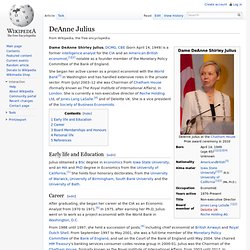
She began her active career as a project economist with the World Bank[3] in Washington and has handled extensive roles in the private sector. From (July) 2003–12 she was Chairman of Chatham House (formally known as The Royal Institute of International Affairs), in London. She is currently a non-executive director of Roche Holding Ltd, of Jones Lang LaSalle.[4] and of Deloitte UK. She is a vice president of the Society of Business Economists. Early life and Education[edit] Julius obtained a BSc degree in economics from Iowa State University, and an MA and PhD degree in Economics from the University of California.[1] She holds four honorary doctorates, from the University of Warwick, University of Birmingham, South Bank University and the University of Bath.
Dame DeAnne Julius appointed next Chair of UCL Council. Dame DeAnne Julius has today been named as the next Chair of UCL Council – taking over from the current Chair, Sir Stephen Wall, with effect from 1 October 2014.
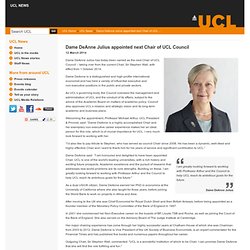
Dame DeAnne is a distinguished and high-profile international economist and has held a variety of influential executive and non-executive positions in the public and private sectors. As UCL’s governing body, the Council oversees the management and administration of UCL and the conduct of its affairs, subject to the advice of the Academic Board on matters of academic policy.
Council also approves UCL’s mission and strategic vision and its long-term academic and business plans. Welcoming the appointment, Professor Michael Arthur, UCL President & Provost, said: “Dame DeAnne is a highly accomplished Chair and her exemplary non-executive career experience makes her an ideal person for this role, which is of crucial importance for UCL. I very much look forward to working with her. Dame DeAnne Julius. Dame DeAnne Julius appointed next Chair of UCL Council. BHP Billiton - Home. Fossil fuel divestment campaign targets UCL and BHP Billiton. The fast-growing campaign to persuade investors to dump fossil fuel stocks has set its sights on a twin target of the world’s biggest mining company and one of the globe’s best universities.
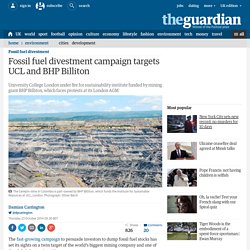
The mining giant BHP Billiton will face protests at its AGM in London on Thursday over its £6m association with University College London (UCL) and the effects of its activities around the world. The fossil fuel divestment campaign began in the US, where cities, churches and universities have shed their stocks, and has spread rapidly to 50 universities in the UK, with Glasgow the first breakthrough.
This week has seen protests against UK banks, which have provided £66bn of funding for fossil fuel extraction. “UCL is doubly implicated in the devastation that BHP Billiton in causing in countries like Indonesia and Colombia, both through its investments, and through its funding of UCL’s Institute for Sustainable Resources,” said Pekka Piirainen from the Fossil Free UCL campaign. Does the end justify the means? The UCL/BHP Billiton Institute for Sustainable Resources - Road to Paris - ICSU.
UCL took money from the mining industry to research sustainable resources.
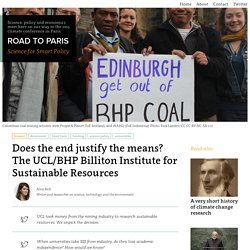
We unpick the decision. When universities take $$$ from industry, do they lose academic independence? How would we know? UCL’s David Price on their money from Billiton: “A philanthropic donation. It comes without strings.” David Price is Vice-Provost for Research at University College London (UCL), but he’s also an Earth Scientist.
He’s trained generations of scientists to work in the extractive industries. Should mining money fund sustainability research? The UCL and BHP Billiton, Part II - Road to Paris - ICSU. UCL: London’s Global University, or London’s Global ~ WARMING ~ University?
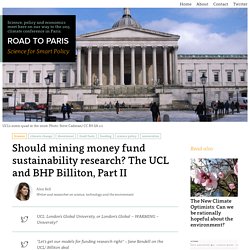
“Let’s get our models for funding research right” – Jane Rendell on the UCL/ Billiton deal Are scientists who refuse to take money from the fossil fuel industry seen as fusty academics? University College London likes to brand itself as London’s Global University. They’re understandably keen to emphasize the international scope of their work — that they garner staff, students and intellectual attention from all over the world.
So it’s a bit embarrassing to see the corridors plastered with adverts for an anti-fossil fuel student society subverting the motto for London’s Global ~ WARMING ~ University, hoping to highlight the institution’s multiple relationships with the fossil fuel industry. It’s perhaps especially embarrassing as one of the areas UCL attracts so much attention for is their expertise on climate change. It’s embarrassing, but is it a problem? “It struck me that it was a potential conflict of interest.